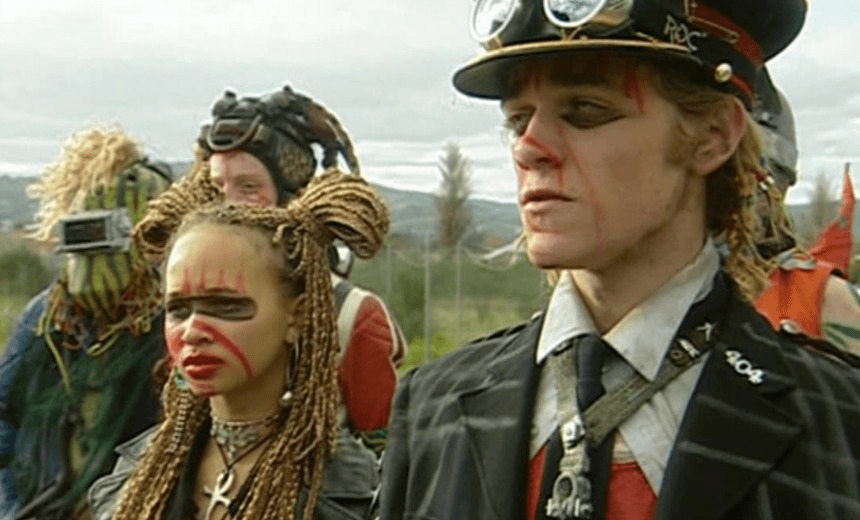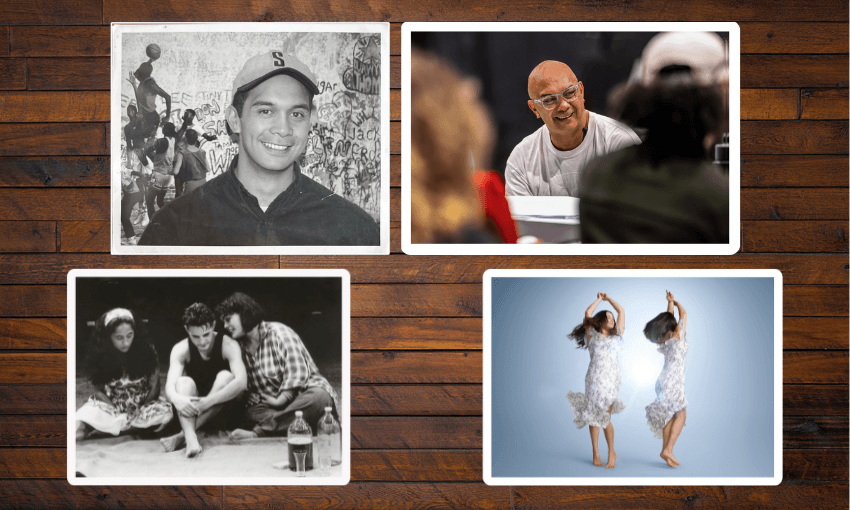Patrick Hunn fondly remembers shambolic local young adult series The Tribe.
The things you read, watch, play or listen to when you’re a kid stick with you, because kids are dumb and have brains made of a pliable grey paste. These squawking, colourful things leave marks that are baked into your memory by the general, messy business of growing up. The cultural half-life of children’s entertainment means that most of these things don’t have much worth to anyone outside of their first, adoring audience.
But to those who do remember, however fuzzily, there is a permanent delight in remembering the stuff that filled the empty hours between finishing school and sitting down for dinner.
The Tribe is a television show about a world where all the adults in the world have been killed off by a mysterious virus, leaving children to fend for themselves. As an adult I can recognise that, even by the low standards of children’s television, it was a kaleidoscopic disaster. But it’s a disaster I’ve always loved.
There’s been a public discussion for a while about the malaise that has paralysed New Zealand television. While I understand that most people are envisaging Borgen or Breaking Bad or whatever’s big in Scandinavia right now when they talk about the kind of work we could make, I think that The Tribe is a more accurate representation of what we’re really good at.
While sick, recently, I devoured an unconscionable amount of dated children’s television. Curled up in a ball in bed, slipping in and out of the sort of fever where your body begins to lose its shape and your sheets begin to smell like beef tallow, I watched all 260 episodes of The Tribe on Youtube.
“Ah, The Tribe!” I croaked, as, for one blissful moment, nostalgia briefly negated waves of nausea. I couldn’t remember any of the particulars, but as the opening credits played, I remembered what I had seen and felt as a child sat in front of the television after school. A technicolour fantasy that took the general premise of Lord of the Flies and replaced the themes of William Golding’s allegory of the fragility of society with wet-look hair, clip-on earrings and a lot of unprotected sex. I have seen the cradle of civilisation after The Fall, and it is a mall in Lower Hutt.
It was the best thing I’d ever seen.
Having mainlined the first few series in between bouts of unconsciousness, I am now convinced, and shall be forever more, that it is the best thing that New Zealand has ever produced. It’s also the worst, but that’s okay.
The Tribe won’t be remembered in television history. If you poke around on the internet you won’t find much apart from a list of mangled quotes on IMDB and an unattended Wikipedia page mangled by the flatmates of the show’s former child stars.
But it was one of a very scant number of international successes that New Zealand has ever been party to, ending after five seasons not because it was losing its audience but because they’d exhausted the premise. It’s the sort of run you’d struggle to maintain outside of Shortland Street or Police Ten-7.
The Tribe entertained in a way that a lot of children’s TV does – without adults, these kids were in charge of themselves and each other. The dialogue was supposed to make the pre-teen characters look witty, urbane and adult because adults, children’s fiction demands, are essentially replaceable. I remember being in awe of these kids, which is really a marvel when you consider some of what actually made it to air.
Ram: “Jay is the coolest guy I know. He takes over a city and just stands there… like he has been eating low-fat yogurt.“
The magic of The Tribe is the confidence it holds in children. It’s a TV show with balls and it really goes for it by killing off everyone over 17. It says that, without their parents, children would simply spring a new culture on a slightly emptier world. And they’d be really good at it. And largely this imagined culture was built through costume.
How do the children who have inherited the earth dress? They dress for a rave held underneath a motorway fly-over, getting really excited about glow sticks and temporary tattoos applied with saliva.
In a distillation of the most enchanting miscalculations of late-90s fashion, The Tribe is a capsule of the late nineties’ fascination with the pointless: decorative zips that lead to nowhere, shirts with a single, swinging sleeve, those crinkly satin tops that were doll-sized in the hand but could be stretched out to cover the chest of an adult woman. There were forehead jewels and long, ethnic earrings that crashed into collarbones. Pipe cleaners threaded through feathered hair. An alarming preponderance of white dreadlocks. This was a dystopia before The Road or The Walking Dead, and now it’s refreshing to tumble through a decorative, altogether cuddlier dystopia.
And it’s this look that defines the cast, whose character traits are distinguished by reference to 1999 fashion: you know that Bray is the hunky lead not only because he’s kinda pretty but because he has a clip-in braid and a skateboard. You know that Lex is a roguish bad boy because he wears sheer tank tops and a clattering plastic rosary. Salene is the motherly, unloveable cook who wears chopsticks in her hair and paints on a Fashion Monobrow. Tai-San is a horrifying mash-up of a bushwalking Jesus and an Asian mystic who has a forehead crowded with bindis, and wears a coat stitched together from those “Chinese” dressing gowns.
Outside of the way it looked, I admire The Tribe for what it says about what New Zealanders think of themselves. New Zealanders have an odd relationship with putting themselves on screen. Sometimes writers, directors and producers embrace our distinctive tics, usually in the form of a comedic reduction. Taika Waititi trades on this very heavily, with undeniable success.
At other times, our distinguishing features are dropped or smudged around the edges – whether as a stylistic choice or out of embarrassment. A lot of the television we produce is like this – characters might look and sound like us, but the facts of the story mean it could be set in any English-speaking city in the West.
The Tribe, an international production, charmingly and entirely unsuccessfully strives for the latter.
Set in and around a nameless city, it deliberately blurs any sense of place by asking its cast to speak in either their native Kiwi accent or in an American one. If you’ve ever seen New Zealand high schoolers mount a production of The Crucible or West Side Story, you’ll be familiar with how this pans out. The inability of the New Zealand tongue to convincingly produce rhotic Rs (think the ‘r’ in ‘heart’) means that we all generally sound like we belong to an inbred branch of the Kennedy family.
And, because this was a British co-production, with English writers, the language these kids use sounds foreign and clumsy. They “fancy the trousers off” each other. They lust after “choccy bars” and “crisps”. A foolish character might “still believe in Father Christmas”. It’s a ridiculous chain of decision making: to have young New Zealand actors mangling British slang in doughy American accents, both charming and irritating all at once.
But more than anything, there’s something beautiful about seeing Wellington’s streets being mocked up to be the setting for the world’s friendliest apocalypse. Frequently we’re treated to shots of the bad guys hooning up and down the same street near Lambton Quay in roller blades, kicking over spotless aluminium rubbish bins stacked in neat piles for that very purpose.
In-between sugary, child-friendly escapades (I’ve got a pet cow! I miss my mum! We’ve run out of choccy bars!), there was a lot of markedly adult stuff in The Tribe. There’s an attempted rape in the first few episodes, although it isn’t really recognised as such. In one absurdly dark twist, a 14 year-old character develops bulimia so severe that she sells herself into slavery in a brothel run by children to pay for the food she ploughs through when binging. There are a handful of marriages and a handful of pregnancies. Characters are paired up and torn apart at a frightening speed.
These relationships, formed in the absence of any chaperoning, have an adult intensity, albeit in a frothy, soap opera-lite way. When you’re nine there is nothing more devilish and pleasurable than seeing two thirteen year olds marry and have a child.
Trudy, played by Antonia Prebble, was the locus for a lot of these topical, young-people big issues. Prebble is, by most standards, a national icon because she was in Outrageous Fortune. In The Tribe, Prebble played Trudy, the most questionably assembled character ever put to air.
At 14, Trudy goes through a teen pregnancy, then has post-partum depression. She is briefly suicidal. She is voted out of the tribe (this is before Survivor was on air). She imagines a relationship with the hottest boy in school the abandoned mall she lives in. She abandons her baby. She accidentally sells her friend into slavery. She is briefly worshipped by a cult before being disowned by the cult when they realize how useless she is. She does all of the above dressed in shapeless shit-coloured hessian capes and make-up applied to make her look in a state of permanent distress.
As a consequence of her unlikeability on The Tribe, I’ve never warmed to Antonia Prebble (which is probably a testament to her powers as an actor) and have never watched Outrageous Fortune.
But my strongest feelings are directed at Tai-San, who makes her initial appearance in a pair of piss-yellow cycling glasses and a complicated arrangement of seven bindis. When I finally stopped watching The Tribe, halfway through season three, it was mostly because I’d had enough of Tai-San. I thought I’d started thinking I’d make it to the end, but she was really grinding me down.
When her actions have caused the entire tribe to be punished through starvation, Tai-San tells everyone, “Hunger can sharpen the senses, increase awareness. Sometimes it’s good to deny yourself food.”
Having abandoned ship, I went online looking for spoilers as to how the show ends. The only précis I found might be the best description of an ending I’ve ever come across: “They put their hands together and say “Yay!” and the credits end.”



